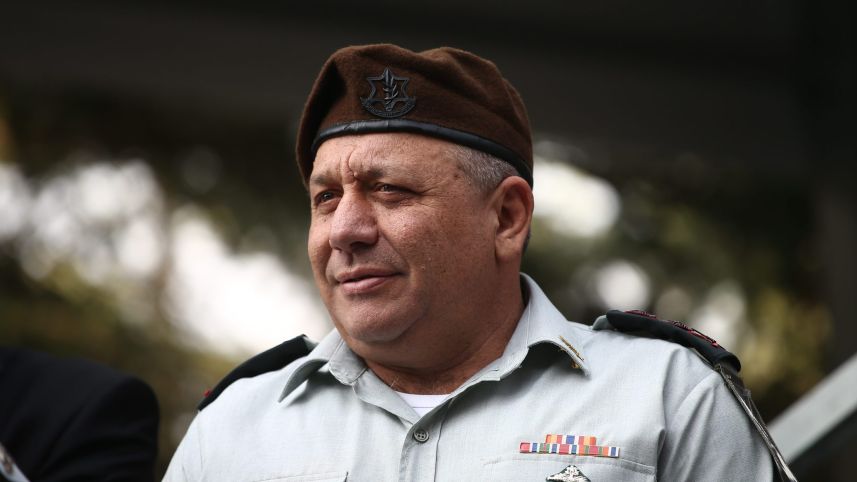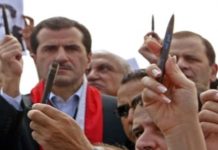في مقابلة هي الاولى من نوعها لصحيفة عربية رئيس الأركان الإسرائيلي لـ”إيلاف”: لا توجد نية لمهاجمة حزب الله بلبنان/مستعدون للتعاون مخابرتياً مع السعودية بما يتعلق بإيران
مجدي الحلبي/إيلاف/16 تشرين الثاني/17
إيلاف من تل أبيب: قال رئيس الاركان الاسرائيلي الجنرال غادي إيزنكوت إن المخطط الايراني هو السيطرة على الشرق الاوسط بواسطة هلالين شيعيين الاول من ايران عبر العراق الى سوريا ولبنان والثاني عبر الخليج من البحرين الى اليمن وحتى البحر الاحمر.
وأضاف خلال مقابلة حصرية مع “إيلاف”، هي الأولى مع صحيفة عربية، أن ما يقال عن مساندة جبهة النصرة في سوريا هو كلام فارغ وبين أن النصرة ومشتقاتها عدوة لاسرائيل مثل داعش. وبين أن الجيش الاسرائيلي يساعد القرويين في الجولان من ناحية طبية ويساعد الدروز كأخوة وانسانيًا فقط.
وقال رئيس الأركان إن للسعودية وإسرائيل مصالح مشتركة ضد التعامل مع إيران. ونفى وجود أي نية لدى جيش بلاده لمهاجمة حزب الله في لبنان لكن لن تقبل إسرائيل بأي تهديد استراتيجي لها.
ووصف وضع بلاده العسكري بالافضل منذ قيامها من ناحية القدرات والامكانات وفرض الاحترام والتقدير، وتطرق الى مسائل كثيرة بما يتعلق بالوضعين السوري واللبناني ومشاكل الشرق الاوسط والعلاقات الإسرائيلية العربية وتقاطع المصالح بالكامل بين إسرائيل والدول العربية وضرورة اقامة تحالف في المنطقة لمواجهة المد الإيراني ومحاولات ايران التموضع في سوريا والعراق ولبنان والبحرين واليمن، كما قال بصراحة إن خطوة استقالة الرئيس الحريري كانت مفاجئة إلا إنه تحدث عن وهن بدأ مؤخراً يصيب مؤسسات حزب الله بسبب الحرب السورية.
وقال الجنرال ايزنكوت انه يتابع ما تنشره “إيلاف” الى جانب اهتمامه بالإعلام العربي.
هنا نص المقابلة التي جرت في مكتب الجنرال غادي إيزنكوت بمقر هيئة الأركان وعبّر عن سروره بهذه الفرصة للتحدث عبر الاعلام العربي عن اسرائيل عسكرياً وسياسياً.
قال رئيس الأركان الإسرائيلي في مستهل المقابلة إن دولة إسرائيل هي الآن في أفضل حالاتها العسكرية فقد تطورنا كثيرًا، فلدينا القوة العسكرية والاستخبارات وسلاح الجو والمشاة بافضل الاحوال والجميع يعرف ذلك، ونحظى بالتقدير من الدول المعتدلة في المنطقة.
بالنسبة للتحديات ففي السابق التهديد كان من جيوش الدول مثل الجيش السوري او غيره، اما اليوم فهناك مناطق توتر سريعة الاشتعال مثل لبنان على يد حزب الله والضفة الغربية وغزة وسيناء وسوريا وأحداث تكتيكية محلية قد تؤدي إلى مواجهة استراتيجية واسعة , ولكن الخطر الفعلي الاكبر في المنطقة هو ايران فهي لديها ثلاثة أمور مهمة تعمل عن طريقها اولا البرنامج النووي الذي تم تجميده مؤقتاً، ولا توجد اي شكوك بالنسبة لنوايا إيران بالحصول على قدرات نووية.
ثانيا بسط نفوذها في المناطق المختلفة وتفعيل اذرع تقوم بمهمات مثل حزب الله والحوثي والجهاد الاسلامي.
ثالثا تحاول إيران تغيير قوانين اللعبة في المنطقة عن طريق نقل الخبرات وبناء مصانع الاسلحة وتزويد الاسلحة المتطورة والاخرى والطائرات المسيرة، وهم يستثمرون اموالاً طائلة في الحرب وعلى المليشيات المختلفة.
مقابل ذلك هناك سياسة اميركية باقامة تحالف لمحاربة داعش ونجحوا بذلك وايضا تحاول الولايات المتحدة تقوية ودعم المحور السني المعتدل في المنطقة وبدون ادخال جيوش او قتال على الأرض. من ناحية ثانية هناك سياسة روسية ترى فقط المصالح الروسية في سوريا والروس يعرفون كيفية التناغم مع كل الاطراف فهم تحالفوا مع الاسد وايران وحزب الله من جهة ومع الأميركيين في الحرب على داعش ومع تركيا ومعنا في اطار جهاز منع الاحتكاك الذي يعمل بشكل ممتاز.
وماذا عن داعش في سوريا؟
اذا نظرنا الى خريطة سيطرة داعش قبل نصف عام في سوريا ونقارنها اليوم، نرى ان داعش انحسر كثيرًا، وان القضاء على هذا التنظيم بات وشيكا ولكن قد يعود نفس الفكر باسماء وتنظيمات اخرى في سوريا وفي المنطقة.
وماذا تريد إيران برأيكم؟
يمكن رؤية المخطط الايراني هو السيطرة على الشرق الاوسط بواسطة هلالين شيعيين الاول من ايران عبر العراق الى سوريا ولبنان والثاني عبر الخليج من البحرين الى اليمن وحتى البحر الاحمر وهذا ما يجب منع حدوثه في المنطقة، بعد تصريحات وخطاب الرئيس الاميركي دونالد ترمب الذي أكد على ضرورة منع البرنامج الصاروخي الايراني والتموضع في سوريا والعراق وارى بذلك بشرى للمنطقة.
في هذا الامر هناك توافق تام بيننا وبين المملكة العربية السعودية والتي لم تكن يومًا من الايام عدوة او قاتلتنا او قاتلناها، واعتقد ان هناك توافقاً تاماً بيننا وبينهم بما يتعلق بالمحور الايراني، فانا كنت في لقاء رؤساء الاركان في واشنطن وعندما سمعت ما قاله المندوب السعودي وجدت انه مطابق تمامًا لما افكر به بما يتعلق بايران وضرورة مواجهتها في المنطقة وضرورة ايقاف برامجها التوسعية.
كيف ترون الموقف الأميركي لإدارة الرئيس ترمب؟
توجد مع الرئيس دونالد ترمب فرصة لتحالف دولي جديد في المنطقة ويجب القيام بخطة استراتيجية كبيرة وعامة لوقف الخطر الايراني ونحن مستعدون لتبادل الخبرات مع الدول العربية المعتدلة وتبادل المعلومات الاستخبارية لمواجهة ايران.
هل شاركتم السعودية بمعلومات في الفترة الاخيرة؟
نحن مستعدون للمشاركة في المعلومات اذا اقتضى الامر. هناك الكثير من المصالح المشتركة بيننا وبينهم.
ماذا بخصوص الازمة السورية؟
نحن لدينا سياسة واضحة وهي عدم التدخل في الحرب السورية ولكن فقط عندما رأينا محاولة تعدٍ على اخواننا الدروز تدخلنا في حضر وانتم كتبتم عن هذا في “إيلاف” وجهزنا المدرعات على جبل الشيخ وحذرنا النصرة بأننا سنهاجمهم اذا دخلوا حضر، وهذا ما كان وانتهت الازمة.
يقولون انكم تساندون النصرة وغيرها في الجولان، وحتى أن اعضاء كنيست اسرائيليين يقولون ذلك؟
هذا هراء وكلام فارغ، النصرة ومشتقاتها عدوة لنا مثل داعش واكثر من مرة وجهنا لهم ضربات نحن نساعد القرويين في الجولان من ناحية طبية ونساعد اخوتنا الدروز ونساعد انسانيا فقط.
ماذا عن التواجد الايراني في سوريا؟
مطلبنا ان يترك حزب الله سوريا وان تنسحب ايران ومليشياتها من سوريا ونحن قلنا علنًا وبشكل هادئ وسري اننا لن نقبل بالتموضع الإيراني في سوريا بشكل عام وبالاخص تمركزهم غرب طريق دمشق-السويداء، ولن نسمح بأي تواجد ايراني ,حذرناهم من بناء المصانع او القواعد العسكرية ولن نسمح بذلك .
ماذا في الشأن اللبناني؟
الوضع اللبناني معقد وخطوة الحريري بالاستقالة من الرياض كانت مفاجئة، ولكن ارى ان حزب الله بدأ يشعر بالضغط المالي وبدأ يدخل في مشاكل مادية كبيرة ونرى انحساراً في تأييد حزب الله، وهناك تململ في الشارع المؤيد لحزب الله وايضًا تظاهرات في الضاحية الجنوبية، الامر الذي لم نرَه سابقا.
في ظل الازمة هناك من يقول إن اسرائيل ستوجه ضربة لحزب الله في لبنان؟
لا توجد لدينا أي نية للمبادرة بهجوم على حزب الله في لبنان والوصول الى حرب، ولكن لن نقبل ان يكون هناك تهديد استراتيجي على إسرائيل. وانا سعيد جدًا للهدوء على جانبي الحدود، الامر الذي استمر طيلة 11 سنة. ونرى من الجانب الآخر محاولات ايرانية قد تؤدي للتصعيد ولكنني استبعد ذلك في هذه المرحلة.
حزب الله حاول في الفترة الاخيرة ادخال ضباط له في المؤسسة الامنية اللبنانية، ونجح بذلك بالرغم من ان الحريري أراد ان يبني دولة مؤسسات وعدم مشاركة حزب الله فيها.
http://elaph.com/Web/News/2017/11/1177142.html
Israeli Military Chief Gives Unprecedented Interview to Saudi Media: ‘Ready to Share Intel on Iran
Amos Harel /Haaretz/November 16/17
Israel and Saudi Arabia are in full agreement about Iran’s intentions, Lt. Gen. Gadi Eisenkot tells Elaph, noting the two states have never fought each other
In an unprecedented move, a Saudi newspaper published an interview on Thursday with the Israeli military chief, Lt. Gen. Gadi Eisenkot. It marks the first time any senior Israel Defense Forces officer, let alone the chief of staff, has been interviewed by a media organization in Saudi Arabia, which does not have diplomatic ties with Israel.
In the interview to the Saudi online newspaper Elaph, Eisenkot called Iran the “real and largest threat to the region.” He said Israel and Saudi Arabia are in complete agreement about Iran’s intentions.
He also noted that Israel and Saudi Arabia have never fought each other.
Eisenkot said that Israel’s security situation has never been better. He said that was why it is “highly regarded by the moderate countries in the region.”
Israel’s military chief accused Iran of trying to destabilize the region by building weapons factories and supplying advanced arms to guerilla and terrorist organizations across the Middle East.
“Iran seeks to take control of the Middle East, creating a Shi’ite crescent from Lebanon to Iran and then from the [Persian] Gulf to the Red Sea.
Eisenkot said Israel has no intention of initiating an attack on Hezbollah in Lebanon. “We see Iranian attempts at bringing about an escalation, but I don’t see a high chance for this at the moment.”
The interview follows the news that broke two weeks ago of Lebanese Prime Minister Saad Hariri’s tumultuous resignation, and the wave of arrests of Saudi princes, ministers and businessmen – along with direct public threats by Saudi Arabia, and Israel aimed at Iran and Hezbollah.
Eisenkot also commented on the Middle East policies of the American and Russian governments. He said he welcomed U.S President Donald Trump’s announcement that it is necessary to put an end to the Iranian ballistic missile program and Iran’s growing hold in Syria and Iraq.
“I view it as hope for the region,” he said.
“With President Trump. there is an opportunity to build a new international coalition in the region. We need to carry out a large and inclusive strategic plan to stop the Iranian danger. We are willing to exchange information with moderate Arab countries, including intelligence information in order to deal with Iran,” added Eisenkot.
As to whether Israel has already shared such information with Saudi Arabia, Eisenkot said: “We are willing to share information if there is a need. We have many shared interests between us.”
https://www.haaretz.com/israel-news/1.823163?utm_content=%2Fisrael-news%2F1.823163&utm_medium=email&utm_source=smartfocus&utm_campaign=newsletter-breaking-news
IDF Chief Of Staff: Israel Willing To Share Intellligence With Saudis
Jerusalem Post/November 16/17
Israel is willing to share intelligence with Saudi Arabia to confront Iran, IDF Chief of Staff Lt.-Gen. Gadi Eisenkot stated in an interview with Saudi’s Elaph newspaper.
“We are ready to exchange experiences with Saudi Arabia and other moderate Arab countries and share intelligence information to confront Iran,” Eisenkot said in a rare interview with the London-based Saudi-owned newspaper, adding that “there are many shared interests between us and Saudi Arabia.”
“Under US President Donald Trump there is an opportunity to form a new international alliance in the region. We need to carry out a large, comprehensive strategic plan to stop the Iranian threat,” Eisenkot said.
According to the Chief of Staff, the expansion of Iranian influence across the Middle East is a major concern to both Israel and Saudi Arabia.
“The Iranian plan is to control the Middle East through two Shi’ite crescents,” Eisenkot told Elaph. “The first is from Iran through Iraq to Syria and Lebanon and the second across the Gulf from Bahrain to Yemen to the Red Sea. We must stop that from happening.”
Eisenkot, who met with military leaders from around the globe at the second annual conference of the chiefs of staff in Washington in October, told Elaph that what he heard from the Saudi representative about Iranian expansion was “identical” to Israeli concerns.
“This is what should be prevented in the region,” he said, adding that “In this matter there is complete agreement between us and Saudi Arabia.”
While Tehran’s nuclear program has been temporarily frozen, there is no doubt about the country’s intention to acquire nuclear capabilities. Tehran is not only providing arms to terror groups such as Hezbollah in Lebanon, the Houthis in Yemen and Islamic Jihad in Gaza, but is transferring expertise, building weapons factories, supplying advanced weapons and investing huge sums into various militias.
In September a senior IDF officer stated that the Islamic Republic provides $60-70 million to Hamas in the Gaza Strip in addition to hundreds of millions of dollars for their militias in Syria and Iraq and Houthi rebels in Yemen fighting pro-government forces backed by a Saudi-led coalition.
Tehran has also increased its financial support for its Lebanese proxy, Hezbollah, to $800 million a year, a dramatic boost from the $200 million provided in the past.
Trump: Saudi Arabia has a “very positive” feeling toward Israel
According to IDF assessments, while Hezbollah has increased its military capabilities due to its fighting in Syria, the group has spread its troops across the entire Middle East and is hurting financially.
“I see Hezbollah beginning to feel financial pressure. We are also seeing a drop in support for Hezbollah and that is reverberating on the streets where we have seen demonstrations in Dahiya. That’s something we have not seen before,” he said referring to Hezbollah’s stronghold in southern Beirut.
Hezbollah, one of the most prominent terror organizations in the world, has become bogged down fighting in Syria for President Bashar Assad. Of its approximately 22,000 fighters, about 7,000 are fighting for the Assad regime and 2,000 more have been killed in the four years the group has spent in Syria.
Last week Hezbollah Secretary General Hassan Nasrallah accused Saudi Arabia of having appealed to Israel to launch an attack against the group in Lebanon, offering the Jewish State “billions of dollars” to do so.
On Wednesday Iranian President Hassan Rouhani was quoted by Press TV as saying that “It is very reprehensible and shameful for a Muslim country in the region to beg the Zionist regime [of Israel] to bomb the people of Lebanon.”
“It is unprecedented in history for a Muslim country to take such measures, and this indicates the immaturity of the individuals, who have come to power in those countries,” Rouhani added.
Eisenkot told Elaph that while Israel has no intention to initiate a war with Hezbollah in Lebanon, Jerusalem will not accept any strategic threats the Iranian-backed terror group might pose to it, he said.
The Chief of Staff stated that he is hopeful about Trump declaring the need to stop Iran’s missile program and the entrenchment of its troops and militias in Syria and Iraq.
“Our demand is that Iran, Hezbollah and other Iranian militias leave Syria. We have said publicly that we will not accept the Iranian position in Syria in general, and especially their position west of the Damascus-Suwayda road. We will not allow any Iranian presence.”





















